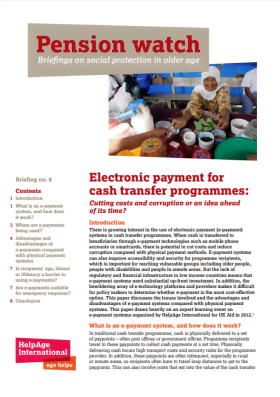Pension Watch Briefing #8: Electronic payment for cash transfer programmes
There is growing interest in the use of electronic payment (e-payment) systems in cash transfer programmes. When cash is transferred to beneficiaries through e-payment technologies such as mobile phone accounts or smartcards, there is potential to cut costs and reduce corruption compared with physical payment methods. E-payment systems can also improve accessibility and security for programme recipients, which is important for reaching vulnerable groups including older people, people with disabilities and people in remote areas. But the lack of regulatory and financial infrastructure in low income countries means that e-payment systems need substantial up-front investment. In addition, the bewildering array of e-technology platforms and providers makes it difficult for policy makers to determine whether e-payment is the most cost-effective option.
This paper discusses the issues involved and the advantages and disadvantages of e-payment systems compared with physical payment systems. This paper draws heavily on an expert learning event on e-payment systems organised by HelpAge International for UK Aid in 2012.



